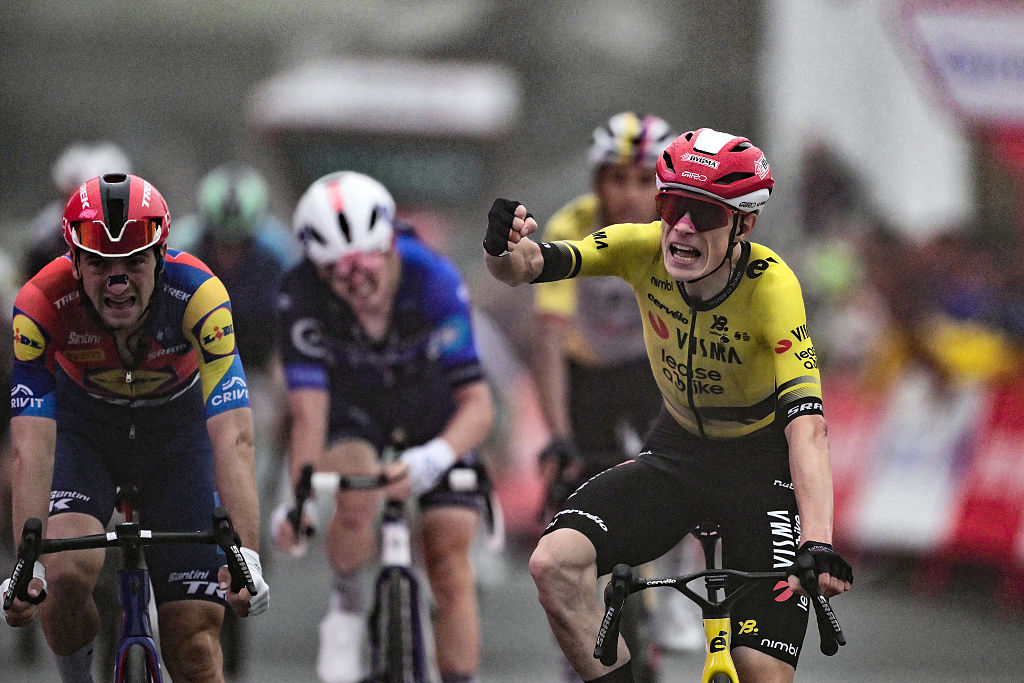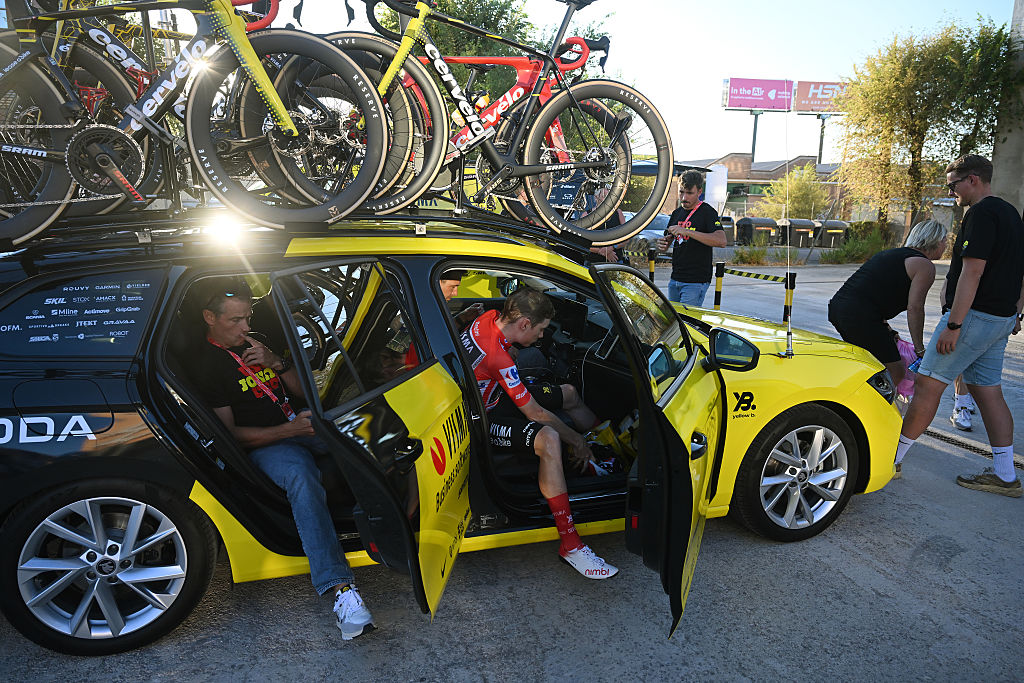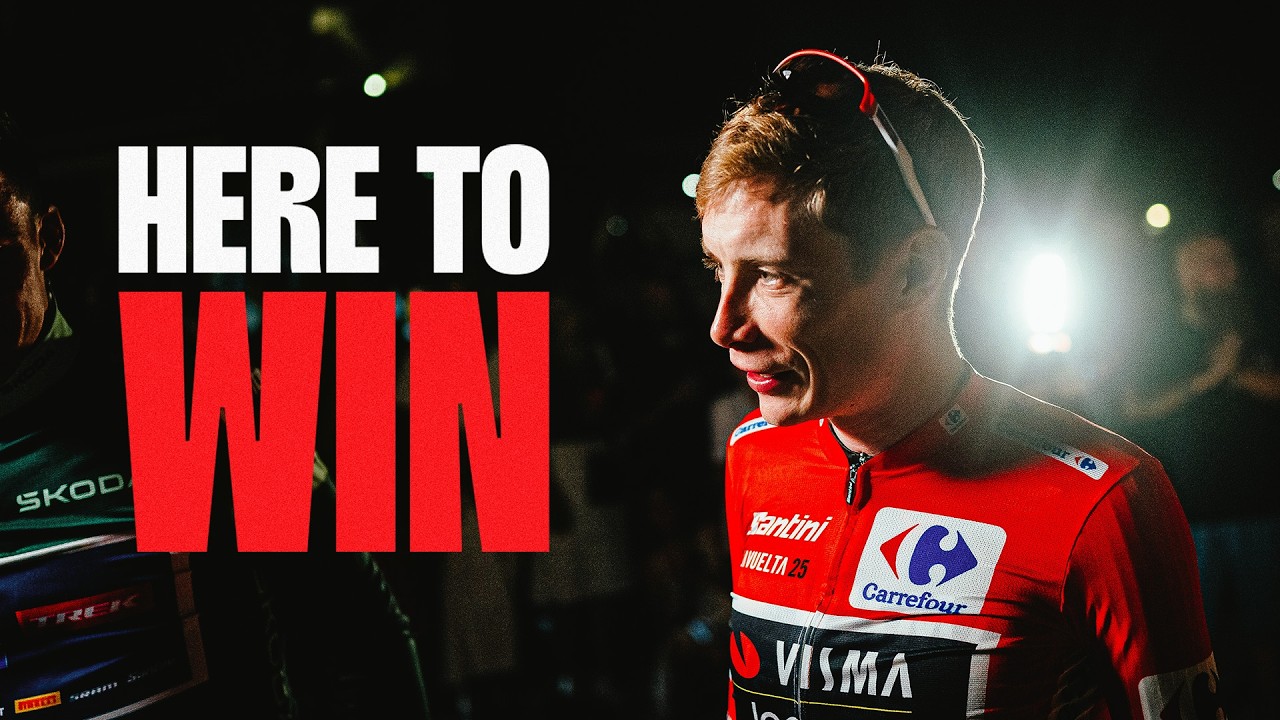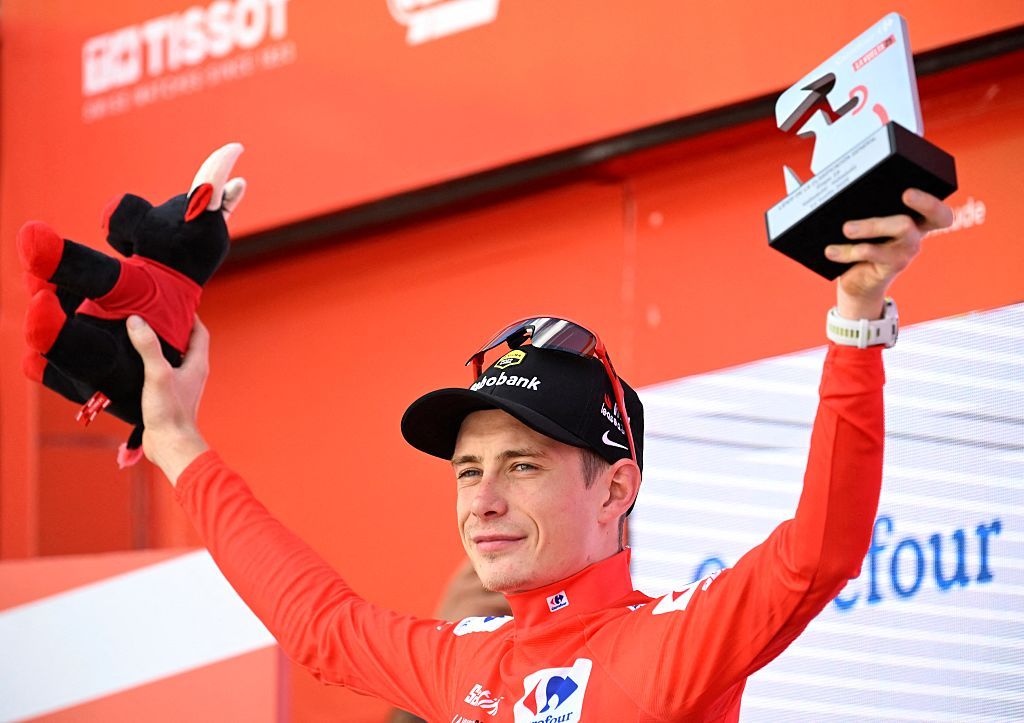No disrespect intended to Jonas Vingegaard (Visma-Lease a Bike), João Almeida (UAE Team Emirates-XRG) and Tom Pidcock (Q36.5) and the other GC contenders in the 2025 Vuelta a España, but during its three tumultuous weeks in Spain this autumn, there were many points when their battle for victory felt like the least of anybody’s concerns. Whether the Vuelta could actually continue to be held was a rather more pressing matter.
In fact, as pro-Palestine demonstrations mushroomed from the relatively tiny kernel of half a dozen people running onto the road in front of Israel-Premier Tech during the stage 5 team time trial to Figueres to the 100,000 protesters demanding the squad’s exclusion in the final stage, more often than not, nobody could be sure of what would happen in the next hours, let alone days. While the organisers insisted ‘there is no Plan B’ to finishing in Madrid, with constant stage route alterations to dodge or limit the impact of the protests and ‘Will the Vuelta continue?’ headlines repeatedly appearing in the media, Plans C, D, E and F were very much in demand throughout.
Furthermore, given the tension and risks to their own safety, throughout the second and third weeks the riders themselves – logically – threatened to stop racing if they could not be sure of some degree of normality. Then, as reporters stood watching policemen firing off rubber bullets and thousands of protesters ripping up barriers and taking invading the finish line – as happened on stage 21 – the competitive side of the Vuelta didn’t exactly feel surplus to requirements. Rather, it was simply eclipsed by something much, much bigger.
You may like
In fact, there were only a couple of points – at the summit of the Angliru on stage 13 and again after the second time trial in Valladolid on stage 18 – that it seemed Almeida might, just, manage to put in a serious challenge to Vingegaard’s superiority. As for Pidcock, his best chance to impact, as he forcefully pointed out in the last press conference of the race, fell foul of the Bilbao protests. Meanwhile, just as when the doping-blasted 1998 Tour de France merged into much bigger questions about the race’s historical role in the country’s culture, or the 2020 Giro d’Italia becoming a prism for Italy’s battle against COVID-19, in weeks two and three the Vuelta morphed from being a normal race into a near-undefinable, shape-shifting kind of political event, a sort of mobile mirror to the massive pro-Palestine grassroots movement in Spain.

Stage 2: Vingegaard takes the win (Image credit: Getty Images)‘Good we don’t say stupid shit”
So when it comes to watching Here To Win, Visma-Lease a Bike’s own hour-long documentary into the Vuelta a España, for all there have been plenty of inside-job films done by teams in the past – including Visma – this one is bound to feel more than a little different. Cleverly, the filmmakers implicitly recognise that from the word go, with their opening sequence of the makeshift winners ceremony, standing on their respective iceboxes with numbers hastily scrawled ‘1’ ‘2’ and 3′ in marker pen on each in a Madrid hotel carpark.
If that final image remains with us throughout, it’s worth bearing in mind that rather than being a Netflix colossus on the scale of Unchained or even the widely acclaimed Movistar series The Least Expected Day”, Here To Win is the work of just two people in the Visma-Lease a Bike set-up. Given their limited resources, that the main interest in the race was largely not in the competition itself, and that this is an account of how the number one pre-race favourite did exactly what was expected of him and won the Vuelta, too, it’s to their credit that Here To Win actually does what it sets out to do – and with a few notable, glaring exceptions, by and large does it well.
Probably the biggest and nicest surprise is the way we get to see some interesting human sides of Jonas Vingegaard. We’ve all witnessed his many televised signs of affection for his family, blowing them kisses as he pedals along. However, getting an idea of Vingegard’s personality has never been easy, given he comes across as quite a private person and his answers in press conferences sometimes feel deliberately devoid of interest points, too.
By contrast, in the film, we see a lot of more human angles to Vingegaard and right from the word go. No sooner have the media participants dropped out from his pre-race video press conference, for example, than he’s directly telling his sports director Grischa Niermann that he’s pleased they didn’t beat around the bush during the interview – “it’s good we didn’t say stupid shit” – and that instead he and Visma have assumed their role as favourites. “I’m not here to finish second,” is Vingegaard’s parting shot at the documentary cameras as he goes off-screen and out of the Turin hotel room.
Yet given that determined start, it’s equally revealing how much his motivation varies, too, the pendulum swinging from a kind of absenteeism on day one to full gung-ho mood. Bullish in the press conference, as we saw, after the first stage, whilst on the massage table – traditionally a place where riders communicate more freely – Vingegaard tells his sports director that right up until the race’s opening climb, he didn’t feel totally committed. But then 24 hours after that, as Vingegaard blasts to victory on the first uphill finish in a tight photo finish at Limone Piemonte, his internal mindset has clearly shifted back to total motivation. Then there’s another heartwarming insight into his human side after stage 9, when Vingegaard cheerfully admits to Niermann that his winning attack at Valdezcaray came after completely misremembering the number of kilometres he’d have to face on the final climb. All of this shows just how much even as experienced a leader as Vingegaard can have mood and attitude swings, and his forgetfulness in the heat of battle is a reminder that even in this depressingly clinical age of perfectly calibrated efforts and data analysis, there’s always room for good old human error.
You may like
As for all the clichés there are about ice-cold Scandinavians, it turns out Vingegaard is not lacking in a deadpan sense of humour, either. During the team time trial planning session, he jokingly says ‘I’m offended’ because while most of the rest of the team have ‘motor’ in their role description written on the plan, his stated mission on the whiteboard is simply ‘maintain the speed.’ Right on the last day before everything collapses on the road to Madrid, he comes off the team bus ready to celebrate a final stage munching a Pringle, telling the cameras with a slight grin that it’s a “pre-race snack.”
The best setpiece race moment by far is the team time trial and its preparation, which is anything but pretty-fied. “Don’t forget you have to remember it’s going to fucking hurt,” team trainer Mathieu Heijboer explains to the riders in the bus, “You’re gonna be crying for Mummy before it’s over, but Mummy’s not going to come. Only after 24 kilometres.”
It’s entertaining, too, to see the riders struggling to get to grips in training with one of the rarest disciplines in the sport, such as the fact that higher speeds, not lower ones, make for better coordination between the unit.
The other riders get much briefer cameos, but they’re no less memorable for all that, such as Matteo Jorgenson’s cry of ‘Fuck, no!’ when he’s asked if he’s up for a two-hour training ride, or Victor Campenaerts’ visible distress when telling the team about his abandon after falling ill in the third week. On the other hand, it would have been nice to have some more insights into Campenaerts and Jorgenson’s hilarious Vuelta vlogs – who could forget the nose hair plucking sessions?
It’s also positively odd how, after guiding Visma to victory in the Vuelta through almost all the Primoz Roglič years, sports director Addy Engels doesn’t get a single interview; his only cameos either driving a car or conspicuously staring at his mobile from the sidelines during a team meeting.

(L-R) Head of Racing of Team Visma- Lease a Bike Grischa Niermann and race leader Jonas Vingegaard after the La Vuelta is neutralised due to disturbances in central Madrid caused by pro-Palestinian protests (Image credit: Getty Images)Where are the protests?
At the other extreme – and the limits mentioned before about two people filming it have to be remembered – there are way too many shots of the sports directors in a team car yelling things of the ‘Come on Jonas’ and ‘You can win this’ variety into their race radio as they urge Vingegaard on to another crack at glory or their high fives after he has, indeed won. Equally, we could have skipped witnessing yet another team bus meeting where riders sitting in their huge armchairs are solemnly told by said directors that ‘the goal is to win’ or Vingegaard cracking open yet another bottle of champagne at the dinner table and exchanging fist bumps with delighted teammates.
Most disappointingly of all is on the Angliru, theoretically the high point of the race, where the coverage starts in upbeat fashion but then runs weirdly flat. There are lots of “We’re going for the win” type comments in the team bus beforehand, and yet more needless episodes of management giving updates on the race radio to Vingegaard. But then, when we get to the top, the fallout from the fact that Vingegard lost to Almeida on a day when he was meant to put the Vuelta GC to bed is given virtually no coverage whatsoever.
Equally, while the footage of the robbery of the team lorry overnight after stage 2 at least allows us to see the impressive damage done to the vehicle by the thieves’ break-in for the first time, the entirety of the second major stoppage of the Vuelta because of protests on stage 16 in Galicia is not deemed worthy of any coverage at all.
At the end of it all, the mocked-up podium ceremony offers a kind of much happier epilogue to it all, whilst underlining the weirdness of a Grand Tour ending like that. As Vingegaard rightly points out, the fact that all the teams, rivals or not, were quick to sign up and send over their podium finishers to celebrate alongside Vingegaard in the Madrid hotel carpark was a nice reminder of how cycling teams are able to put the competition aside at times to come together. But in the closing moments of the film, the real killer final shot is a few minutes before, when Vingegaard gets into the back of a team car after the race has stopped for good on stage 21 because of the protests, and glumly repeats Niermann’s comment of “It’s a shit way to end like this.”
From the riders’ point of view, with the hard work of winning done and on a day normally dominated by the final celebrations – the bigger questions of the reasons for the political protest are another story altogether – it’s impossible to disagree with that comment, but in any case there’s no doubting that, together with the COVID-19 Grand tours, this was probably one of the most unusual and stressful of major stage racing victories of recent years.
So with full credit deserved to Vingegaard and his team – as well as all the other squads – for somehow staying on track in the most difficult of circumstances, ‘Here To Win’ does a fine job of explaining why.
LA VUELTA 2025 – HERE TO WIN | Documentary – YouTube


